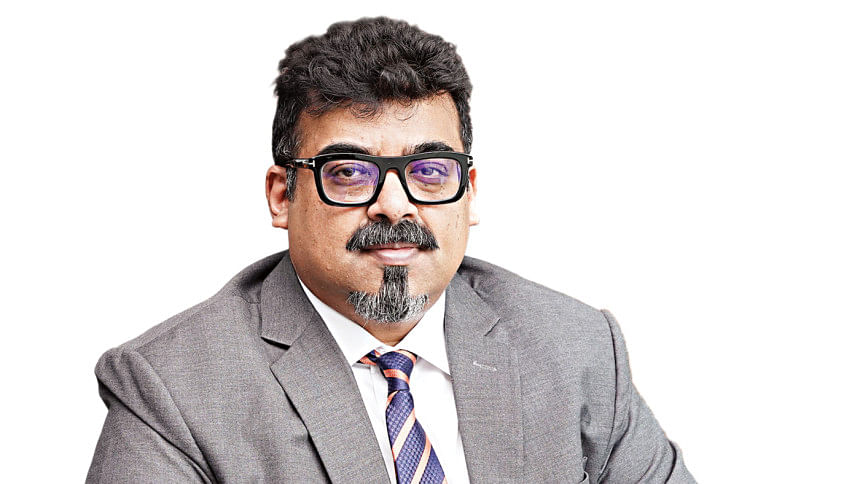Effectively leveraging technology to enhance MSME outreach

M. Nazeem A. Choudhury
Deputy Managing Director, Prime Bank
The Daily Star (TDS): How do you assess the current state of the MSME sector in Bangladesh, and what role do you think banks can play in accelerating its growth?
M. Nazeem A. Choudhury (MNAC): The MSME sector in Bangladesh is a vital engine of employment and economic growth, contributing over 25% to GDP and employing millions. However, it faces challenges such as limited access to formal finance, informality, and low financial literacy. Many MSMEs remain unbanked due to collateral requirements, complex procedures, banks' preference for larger enterprises, high interest rates, and rising operating costs.
Banks can accelerate MSME growth by offering tailored, collateral-free loan products, expanding agent banking in rural areas, promoting digital and green financing, and partnering with fintechs for data-driven lending. Providing training to enhance MSME business acumen and bankability is also essential. Banks should support formalisation, enhance credit guarantee usage, and deliver financial literacy programmes. A proactive, inclusive banking approach is key to unlocking the sector's full potential and ensuring equitable economic progress.
TDS: What are the major challenges MSMEs face in accessing finance, and how is your bank addressing these issues—especially for micro and cottage industries?
MNAC: MSMEs in Bangladesh face key financing challenges such as lack of collateral, informal business structures, limited financial records, low awareness of banking products, high transaction costs, high risk due to market fluctuations, and complex documentation processes. These issues are more acute for micro and cottage industries, particularly in rural areas.
To address this, Prime Bank has introduced tailored and collateral-free loan products, simplified documentation processes, and cash flow-based credit assessments. We are expanding agent banking to reach underserved segments and using alternative data for credit profiling. Additionally, we provide financial literacy training and promote formalisation through partnerships with local institutions. By combining digital platforms, inclusive practices, and relationship-based banking, we aim to make finance more accessible and sustainable for micro and cottage entrepreneurs.
TDS: Does your bank have any dedicated products, financial literacy programmes, or credit guarantee schemes targeted at MSMEs?
MNAC: Prime Bank has undertaken several key initiatives to support MSMEs, including dedicated collateral-free loan products of up to BDT 10 million with simplified documentation, tailored offerings for women entrepreneurs, and specialised solutions like school banking.
Through over 150 agent banking outlets, the bank ensures outreach for loan applications, disbursements, and repayments—particularly targeting micro and cottage industries. The Digital Nano Loan platform facilitates online loan processing and offers e-learning modules on financial management.
Prime Bank also conducts regular financial literacy programmes in partnership with local trade bodies and observes Financial Literacy Day/Week nationwide. Additionally, the bank has integrated with Bangladesh Bank's Credit Guarantee Scheme to ease collateral requirements and promote risk-sharing.
TDS: How has your bank leveraged technology or digital banking solutions to improve outreach and services to MSMEs, particularly in semi-urban and rural areas?
MNAC: Prime Bank has effectively leveraged technology to enhance MSME outreach in semi-urban and rural areas by expanding its agent banking network, which provides real-time services including loan applications and disbursements using biometric and tab-based systems.
The bank is integrating with popular mobile financial services to enable seamless digital loan disbursement and repayment. It is also developing digital lending platforms—often in partnership with fintechs—to offer AI-driven credit assessments and faster access to credit. Additionally, simplified e-KYC processes allow MSMEs to open accounts remotely, reducing dependency on physical branches and ensuring greater financial inclusion.
TDS: What steps is your institution taking to support women-led MSMEs and promote financial inclusion among underrepresented segments?
MNAC: To support women-led MSMEs and promote financial inclusion among underrepresented segments, Prime Bank has introduced specialised products like "Anchol," offering lower interest rates, flexible repayment terms, and collateral-free options backed by Bangladesh Bank's refinance schemes.
The bank actively collaborates with women's chambers and NGOs to identify and assist women entrepreneurs, particularly in cottage and home-based industries. Dedicated Women Entrepreneur Development Units (WEDUs) are set up at branches to offer personalised services and faster loan processing.
Besides that, regular training and financial literacy workshops are conducted in partnership with the SME Foundation and women's associations to enhance business skills and digital knowledge. For underrepresented groups such as rural communities, low-income individuals, and youth, Prime Bank extends services through its widespread agent banking network, enabling basic transactions and loan applications without visiting branches. School banking and targeted literacy campaigns promote awareness from an early age.
Additionally, staff are incentivised to engage these segments, ensuring outreach and support.
TDS: Looking ahead, what policy reforms or collaborative efforts between banks and the government would you recommend to ensure sustainable development of Bangladesh's MSME ecosystem?
MNAC: To ensure the sustainable development of Bangladesh's MSME ecosystem, a collaborative approach involving banks, the government, and regulators is vital. Key reforms should focus on establishing a comprehensive credit information system that incorporates alternative data to support risk-based lending, alongside simplifying business registration, tax filing, and licensing to encourage formalisation.
Strengthening credit guarantee schemes—particularly for micro and women-led enterprises—will help de-risk lending and incentivise banks. Investment in digital infrastructure and interoperability among financial service providers is crucial to foster MSME adoption of digital tools, especially in rural areas.
Co-financing and blended finance models involving banks, government, DFIs, and fintechs can mobilise concessional funding and technical support. Promoting value chain financing and developing MSME clusters with targeted support can enhance competitiveness and financial inclusion.
Offering policy incentives such as tax benefits and refinance windows to banks achieving inclusion benchmarks, along with a centralised data repository for real-time monitoring, will create an evidence-based, responsive policy environment conducive to long-term MSME growth.

 For all latest news, follow The Daily Star's Google News channel.
For all latest news, follow The Daily Star's Google News channel. 



Comments